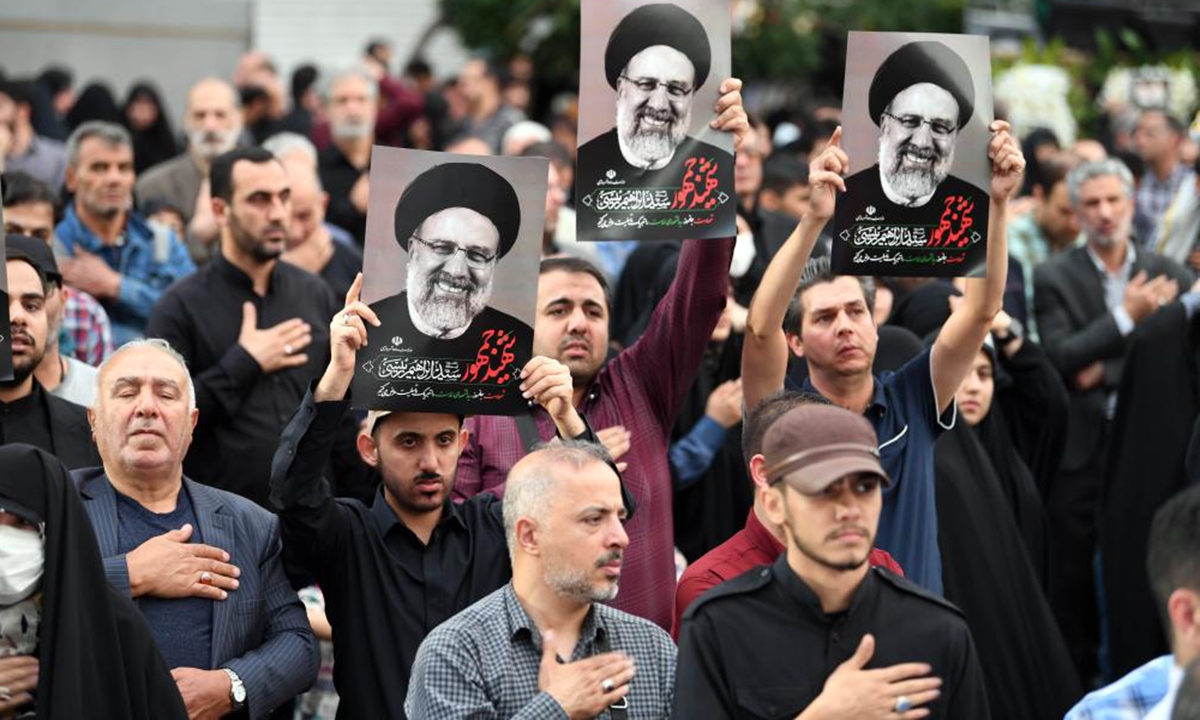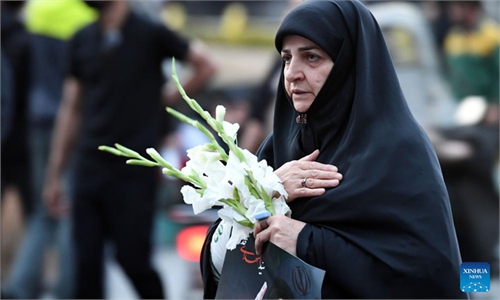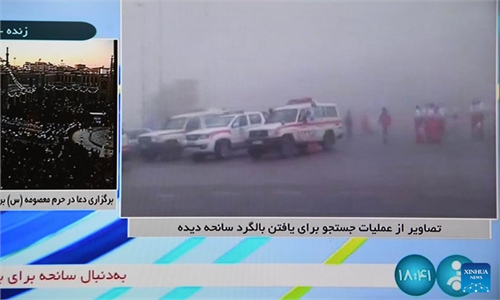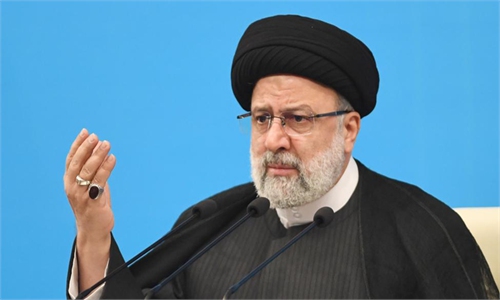
People mourn victims of the helicopter crash near Varzaqan County, in Tehran, Iran, on May 20, 2024. Iranian President Ebrahim Raisi and some members of his accompanying team, including Foreign Minister Hossein Amir-Abdollahian, were confirmed dead Monday morning as the wreckage of the helicopter carrying them was found following its crash in bad weather on Sunday near Varzaqan County. Photo: Xinhua
Iranian President Ebrahim Raisi was confirmed dead on Monday after his helicopter crashed in the country's mountainous northwestern region on Sunday, along with Iranian Foreign Minister Hossein Amir-Abdollahian and Governor-General of East Azerbaijan Province Malek Rahmati.
According to public information, due to severe weather conditions, the helicopter was forced to make a highly dangerous hard landing, resulting in the tragedy. The Islamic Republic of Iran News Agency reported that the helicopter crashed "due to technical failure." Some attribute this to US sanctions, as the sanctions prevented timely updates to the parts of the already-aging helicopter.
However, many conspiracy theorists hold a different view, believing that there is a high possibility of sabotage. Their main reasons are as follows: under the same severe weather conditions, the other two helicopters traveling together safely reached their destination. Logically, the helicopter carrying the president should have the best quality and highest safety standards, and the crew should have the highest level of technical expertise.
However, this conspiracy theory viewpoint is, at least for now, just a reasonable speculation and lacks concrete evidence. According to reports, in interviews, Israeli officials denied any connection between the crash and Israel.
If the crash was caused by objective reasons and had nothing to do with Iran's enemies, the death of Raisi would undoubtedly have a certain political impact. This includes the impact on Iran's internal politics and foreign relations, especially on its relations with the US and the West.
The impact on Iran's internal politics mainly stems from Raisi's roles as Iranian President, a potential successor to the Supreme Leader, a key representative of the conservative faction, and a loyal follower of Ayatollah Ali Khamenei.
As president, Raisi's death would disrupt certain important domestic political activities and, more importantly, the overall political process in Iran. According to normal political procedure, Raisi was supposed to complete his presidential term in 2025, meaning that Iran should have held presidential elections around June 2025. However, this normal political process was disrupted by Raisi's sudden death, forcing Iran to take emergency measures in accordance with its constitution.
In comparison with his role as president, the impact of Raisi's death as a potential successor to the Supreme Leader is even greater.
It is widely speculated that Raisi was a leading candidate to succeed Ali Khamenei as the Supreme Leader. People had reason to believe he was the chosen successor, as Ali Khamenei had previously served as president before becoming the Supreme Leader, giving Raisi a certain level of legitimacy.
Additionally, Raisi is relatively young, at 63 years old. If Raisi's role as the successor was confirmed, his death inevitably disrupts the strategic political succession plan of Iran's political elite, represented by Ali Khamenei. Considering Ali Khamenei's age of 85, Raisi's death has a significant impact on Iran's political succession.
As a prominent figure representing the conservative faction, the death of Raisi is a loss for the Iranian conservatives, which in turn may increase the relative power of the reformists. As a loyal follower of Ali Khamenei, Raisi may have been the president who had the fewest conflicts with the Supreme Leader. Other presidents have posed challenges to Ali Khamenei, but all failed.
Since the final decision-making power in Iran lies in the hands of the Supreme Leader, not the president, Raisi's death itself will not have a significant impact on Iranian diplomacy. However, the indirect impact should not be overlooked. The indirect impact refers to the fact that Iran's hostile countries, especially the US and Israel, may take advantage of the major changes in Iran's political situation to create chaos internally. This would lead to internal conflicts and weakening Iran, even promoting regime change. The US, Israel, and even European countries, may adopt new strategies in their policies toward Iran, such as cutting off indirect talks with Iran, imposing greater sanctions pressure on Iran and focusing on human rights in Iran. This will, in turn, force Iran to change its foreign policies.
The author is a professor from the School of Government at the Shanghai University of Political Science and Law. opinion@globaltimes.com.cn



